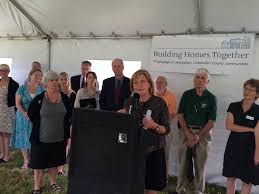 Working in a non-profit organization, and often working most directly on public policy and advocacy issues with people in other non-profit or governmental entities, I can easily lose sight of some aspects of the universe of for-profit businesses. I recently started thinking more about how much overlap and shared common interests that my work as an advocate for affordable and inclusive housing has with at least some private for-profit housing developers. We both are often striving for zoning by-laws that permit a higher density of homes, narrower setback requirements, more flexible parking requirements and simpler-more predictable permitting processes among a myriad of other related things.
Working in a non-profit organization, and often working most directly on public policy and advocacy issues with people in other non-profit or governmental entities, I can easily lose sight of some aspects of the universe of for-profit businesses. I recently started thinking more about how much overlap and shared common interests that my work as an advocate for affordable and inclusive housing has with at least some private for-profit housing developers. We both are often striving for zoning by-laws that permit a higher density of homes, narrower setback requirements, more flexible parking requirements and simpler-more predictable permitting processes among a myriad of other related things.
My primary aim is to create more homes at rental and sale prices that are more affordable to more people in a state with very high housing costs and housing shortages in many places. I know that a more or less planned increasing supply of homes especially in combination with various public subsidies can generate at least some housing that is affordable to people on the lower ends of the income scale. I also know that because of the fact that more people in certain fair housing protected classes tend to have lower incomes and that developing more affordable and accessible homes will increase housing opportunities for people in protected classes. The flip side is that shortages of housing supply, overdevelopment of high end housing on large lot sizes, and long uncertain and unnecessarily daunting and expensive permitting processes will tend to increase the price of homes and that tends to disparately exclude— whether purposely or not— people in protected classes such as many minorities, people with disabilities, and others. My goal is creating more inclusive and less expensive homes and communities, and not creating more exclusive and more expensive homes and communities.
Achieving more of the goals of inclusivity will create conditions that are beneficial to large sectors of our towns and cities—including businesses that need more workers, more shoppers and more consumers of services. Governmental entities will be in better shape also with a broader tax base to help maintain needed services.
To get to a state of increased inclusion and affordability will require some willingness to change some bylaws that have been around for a long time and if they ever had a good purpose do not do so now in our current society and economy. It is in the work of achieving some of these changes that I have come to realize that advocates of fair, affordable and safe homes have good opportunities to collaborate with private developers.
To this end our Fair Housing Project has pulled together some private developers, currently mostly in the Chittenden County, Vermont area, to join forces with us to work on some of those things we agree on and to perhaps mitigate some of the areas of disagreement that we will no doubt have.
Getting stuck in our own limited world view does not help us make real progress in our communities. We can break out of that mode.
Good piece. This may be preaching to the choir, but I have to put in a plug for manufactured housing. It can be a part of the solution, too.
https://prosperitynow.org/resources/solutions-affordable-housing-challenges
We agree completely Arthur. Thanks for your comment.
Thank you, Arthur. Not only are they more affordable but have the potential to create a strong residential community